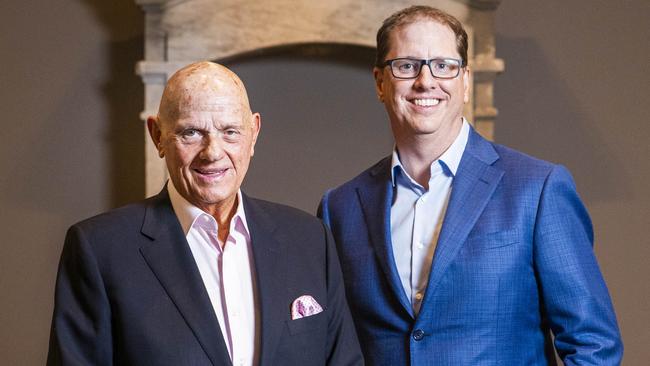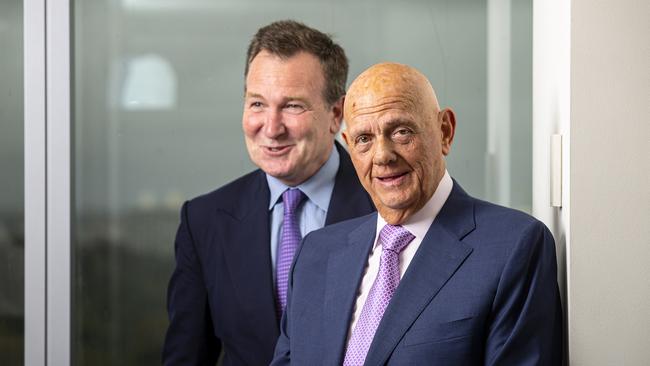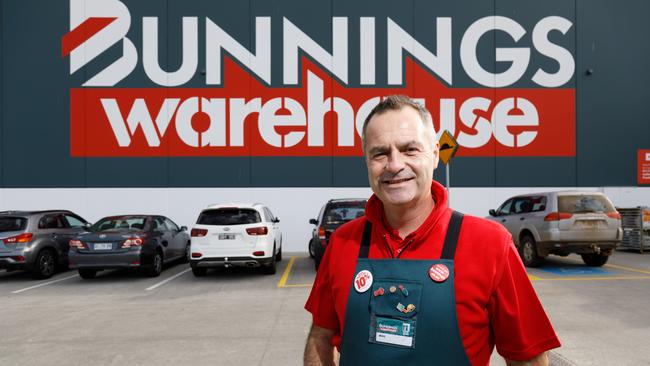Mark McInnes left without a chair when the music stops as Richard Murray takes Premier seat


Cain as expected reported a fall in same store sales from the COVID-inflated number a year ago but said life was getting back to normal with lower costs, a turn away from local store trade and renewed life for inner city stores.
The issue for Coles is whether normal is peak operating conditions which will be seen in Thursday’s numbers from big spending rival Woolworths.
JB Hi-Fi’s Richard Murray and his new boss Lew are both taking risks, with the latter getting someone with market credibility but untested in apparel, vertical supply chains and international operations.
Terry Smart returns to the job he gave up in June 2014 to become the new boss of JB Hi-Fi, replacing Murray who after 18 years is moving to the Lew camp.
Mark McInnes made a lifestyle choice last year to step aside for at least two years to see his children through their final years of primary school and his present contract at Premier expires in August.
You got the sense he was hoping to return Premier but if Murray works out then that will be difficult.
As it is he will collect $2.8m on the way put but arguably not the $2.8m a year for the next two years as a non-compete.

While he and Solly remain close Lew would still be scratching his head at how McInnes can put lifestyle ahead of business.
Ironically Smart, who started at JB Hi-Fi in 2000 when it was still owned by private equity before its 2003 float, also stepped out for personal reasons in 2014 to spend time with his children who have now left school.
Having returned to the fold to run The Good Guys at age 55 he clearly misses the top job and grabbed the chance to come back.
It’s a small world in retailing and his chair Stephen Goddard was CFO at David Jones when McInnes made his name earlier this century.
McInnes has served 10 years with Solly, a stunningly successful time in which the Premier stock price has quadrupled, lifting Lew’s share of the spoils to $1.6bn.
A health scare last year combined with a desire to spend time with his two children before they start senior school prompted his shock decision to leave.
Murray started at JB Hi-Fi just before its 2003 float and has performed superbly. But he has no apparel, vertical sourcing or international experience, all of which are needed in Lew’s empire.
None of which says he can’t learn the trade because like McInnes he has shown himself to be good at business and at retail.
Murray is well aware of the challenges and as a good retailer knows retail is detail and that applies to apparel and TV sets. He will also learn the delights of working for the workaholic Solly.
There are some personnel issues because internal heir apparents John Cheston, the Smiggle boss, and Judy Coomber may need some encouragement to hang around. McInnes will tell everyone who will listen he will be back running a public company again so it remains to be seen just where he hangs his coat next some four years down the track.
Passing the buck
NBN boss Stephen Rue likes to think he has taken the political and industry heat away from his business and in some respects Wednesday’s decision to hand the pricing issue over to the ACCC does just that.
Just whether he will welcome the outcome remains to be seen because the regulator doesn’t have a track record of handing bouquets to monopolies.
Certainly a circuit breaker was needed because in the words of Optus, “These consultations are a waste of time if NBN simply ignores feedback, fails to consider the needs of customers and continues to maintain the fiction that prices are going down.”
Telstra regards the latest round as just a way of increasing retail prices by 7 per cent.
It added NBN Co’s latest proposal “again fails to address the fundamental concerns we and other retailers have about increasing costs and complexity”.
That is not quite the warm and fuzzy spin by the NBN and one wonders when Rue broke bread with Telstra’a Andy Penn last week whether the talks were a little more pointed.
Pleasingly for ACCC boss Rod Sims everyone welcomes his entry into the arena which in his words “is a very significant change”.
It’s not often a regulator’s entry into commercial discussions is welcome and maybe Rue figures he can pass the blame to someone else.
But he has to wear the consequences which will have a clear impact on his own bottom line.
The main dispute is over who bears the risk of picking up the costs of variable increased capacity where under the present system it is charged separately from the fixed user charge.
The issue is now in the ACCC’s hands so maybe Rue has found someone for everyone to blame but not him.

Bunnings buying
While on matters ACCC Mike Schneider at Bunnings will no doubt be subject to a lengthy review of his Beaumont Tiles acquisition even though the retailer’s 110 stores are largely run by franchisees.
When Schneider paid less than $20m for Adelaide Tools last year the ACCC conducted a full examination compared to the more cursory look at Metcash’s bigger Total Tools deal.
Schneider is the elephant in the home improvement and outdoor living market and anything which extends his reach is worth examining. This suggests that Schneider will be well past his second honeymoon before the ACCC gives him a tick on this deal.
Cosy duopoly
Mobile apps are increasingly part of our lives and it’s a business run by two global platforms Google and Apple with a combined 100 per cent market share.
It’s a cosy world, the platforms one, with both giants charging 30 per cent of supplier revenues to house the apps and as shown by the fact Google also pays Apple $US12bn a year to ensure its searches are at the top of its operating system.
Google this week reported a quarterly profit of $US18bn on sales of $US55.3bn so it can afford to pay the rent.
The ACCC flagged potential for litigation given the lack of transparency in the app market which is replete with self-preferencing arrangements, competing default apps owned by the platform and denial of alternate payments systems from those offered by the platform.
IBM gets the nod
The ASX commissioned IBM to do its technology review mandated by ASIC with a report due mid-year. The name of the consultant doing the report has not previously been disclosed but was confirmed by the ASX.







Coles boss Steven Cain said post-COVID retail was getting back to normal, but elsewhere the world was being tipped upside down with Solly Lew having found a safe pair of hands in Richard Murray to run his Premier retail franchises and Terry Smart returning to the job he walked from seven years ago.